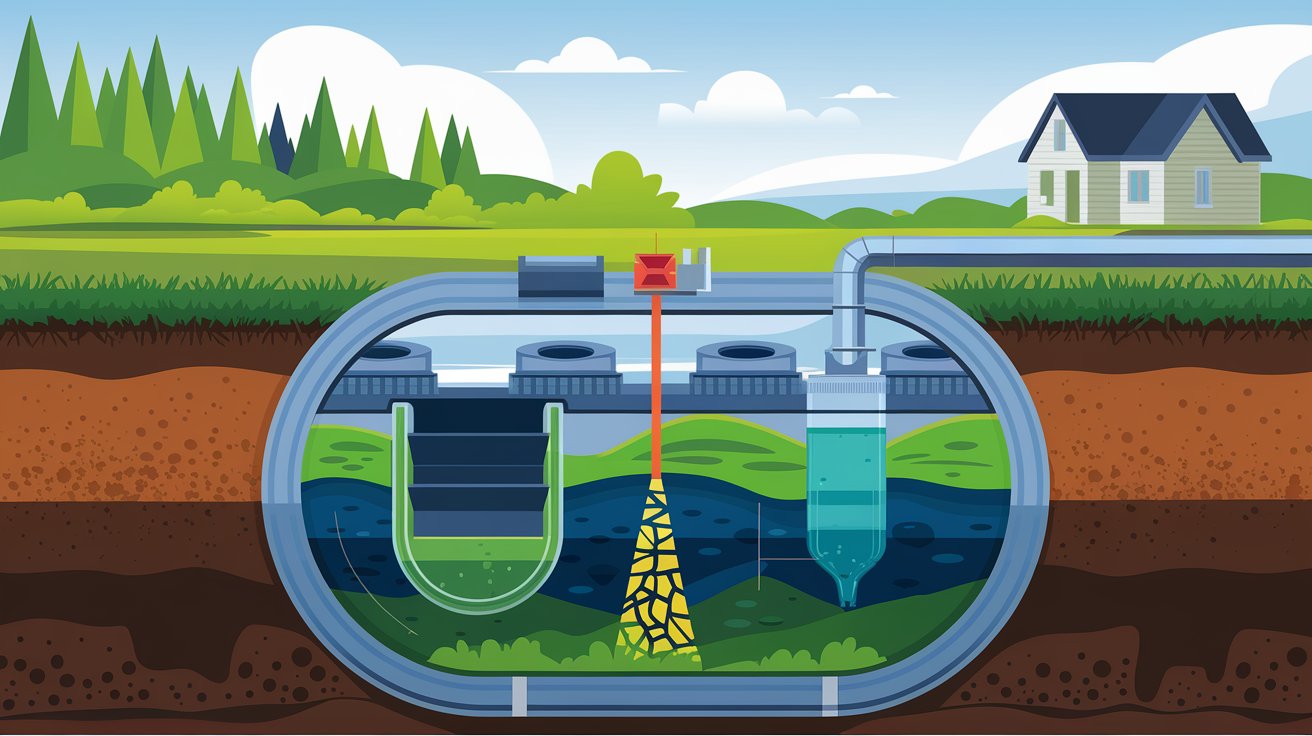Maintaining a septic system can be a costly and time-consuming task, so it’s no surprise that many homeowners are curious if additives eliminate the need for pumping. After all, the idea of simply pouring a product down the drain and skipping the messy pump-out sounds appealing. But does it really work? In this article, we’ll explore what septic additives do, what professionals recommend, and whether you can safely rely on them to maintain your system.
Table of Contents
- What Are Septic Tank Additives?
- How Septic Systems Naturally Work
- Do Additives Really Eliminate the Need for Pumping?
- Risks of Over-Relying on Additives
- The Truth About Maintenance
- When (and If) to Use Additives
- Real-World Example: A Rural Homeowner’s Experience
- Alternatives to Additives
- Contact Info and Resources
- Conclusion: Don’t Skip the Pumping—Even With Additives
- FAQs About Septic Tank Additives
- Septic Permit Links by State
What Are Septic Tank Additives?
Septic tank additives are marketed as products that can break down solid waste, grease, and scum inside your septic tank. They typically come in liquid, powder, or tablet form and fall into two main categories:
Biological Additives
These contain live bacteria or enzymes designed to boost the natural microbial activity in your tank. The goal is to help digest organic waste more efficiently.
Chemical Additives
These may include acids, solvents, or other compounds that claim to dissolve grease and sludge. However, chemical additives can disrupt the balance of your septic system and potentially harm groundwater.
How Septic Systems Naturally Work
To understand whether additives help, you need to know how septic systems function:
- Wastewater flows from your home into the septic tank.
- Solids settle at the bottom, forming sludge.
- Lighter materials like grease and oil float to the top, creating a scum layer.
- Liquid effluent flows out into the drainfield, where it’s naturally filtered by soil.
A well-functioning tank relies on naturally occurring bacteria to break down solids. Over time, sludge and scum accumulate and must be pumped out, typically every 3 to 5 years depending on tank size and usage.
Do Additives Really Eliminate the Need for Pumping?
The Short Answer: No
Despite bold marketing claims, no additive has been proven to completely eliminate the need for septic pumping. In fact, many professionals and government agencies warn against relying solely on additives.
“There is no substitute for regular septic tank pumping,” says the U.S. Environmental Protection Agency. “Additives do not eliminate the need for periodic pumping.”
While some biological additives may assist bacterial activity, they do not remove accumulated solids. Over time, even the most active microbial colony can’t consume everything.
Risks of Over-Relying on Additives
1. System Failure
If you skip pumping and the tank becomes overloaded with sludge, solids can enter the drainfield and cause clogs or backups.
2. Groundwater Contamination
Chemical additives may kill helpful bacteria or leak into the drainfield, polluting wells and local waterways.
3. Voiding Your Warranty
Some manufacturers void system warranties if unapproved additives are used.
The Truth About Maintenance
The most effective septic system maintenance strategy involves a combination of good habits:
- Regular pumping: Schedule a professional pump-out every 3–5 years or as recommended for your household size.
- Smart water use: Spread out laundry loads and repair leaks to prevent overloading the tank.
- Watch what goes in: Avoid flushing non-biodegradables, grease, or harsh chemicals.
Additives may play a supportive role, but they’re not a replacement for proper maintenance.
When (and If) to Use Additives
Some professionals believe that biological additives can be beneficial in specific cases:
- After system startup or pumping, to help restore bacterial balance
- When medications or household cleaners have disrupted the microbial ecosystem
If you choose to use an additive, look for products labeled as NSF-certified or EPA-approved, and avoid those with harsh chemicals or solvents.
Real-World Example: A Rural Homeowner’s Experience
Jane, a homeowner in rural Pennsylvania, tried a monthly enzyme-based additive hoping to delay her next pump-out. After two years, she noticed slow drains and called a septic professional. The technician found the tank nearly full and sludge creeping into the outlet.
“The additive may have helped with odor,” the technician explained, “but it didn’t reduce solids. You still need to pump.”
This is a common story that underscores the importance of understanding what additives can and can’t do.
Alternatives to Additives
Instead of relying on additives, consider these more effective ways to extend your system’s lifespan:
- Install a filter on your outlet baffle to catch solids
- Schedule inspections every 1–3 years
- Divert roof runoff and surface water away from your drainfield
- Educate family members on septic-safe habits
These steps are more impactful than any additive alone.
Contact Info and Resources
- EPA SepticSmart Program – Authoritative information on septic care
- National Onsite Wastewater Recycling Association – Industry guidelines and news
- University of Minnesota Extension: Septic System Owner’s Guide – Practical homeowner tips
- Need help? Contact a certified septic pro in your area to inspect your tank and recommend the right maintenance plan
Conclusion: Don’t Skip the Pumping—Even With Additives
While septic tank additives are marketed as miracle solutions, the truth is more grounded: no additive can replace the need for pumping. Biological products may help maintain bacterial health, but they won’t remove sludge or scum buildup.
If you want a reliable, long-lasting septic system, stick with routine pump-outs, smart usage, and professional inspections. Additives, at best, are optional and supplementary—never a substitute for proper care.
Need professional help or unsure about your septic maintenance schedule? Reach out to a licensed septic expert near you and protect your investment.
FAQs About Septic Tank Additives
Are septic tank additives necessary for system maintenance?
No, septic tank additives are generally not necessary. A properly functioning and maintained septic system does not require additives. Regular inspections and pumping every 3 to 5 years are sufficient to keep the system working effectively.
Can additives replace the need for septic tank pumping?
No, additives cannot replace the need for regular septic tank pumping. While some products claim to break down solids, they do not eliminate non-biodegradable materials that accumulate over time. Regular pumping is essential to remove these solids and prevent system failure.
Do septic tank additives harm the system?
Some additives, especially chemical ones, can harm your septic system by killing beneficial bacteria or causing solids to resuspend and clog the drain field. It’s best to avoid using additives unless recommended by a professional.
How often should I pump my septic tank?
Septic tanks should be inspected every 1 to 3 years and pumped every 3 to 5 years, depending on factors like household size, water usage, and tank capacity.
What are the best practices for septic system maintenance?
- Avoid Additives: Do not use septic tank additives unless advised by a professional.
- Regular Inspections: Have your system inspected every 1 to 3 years.
- Scheduled Pumping: Pump the tank every 3 to 5 years.
- Water Conservation: Use water efficiently to reduce the load on the system.
- Proper Waste Disposal: Avoid flushing non-biodegradable items or pouring grease down the drain.









